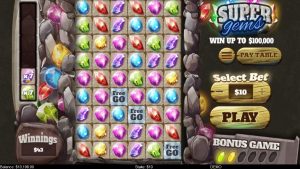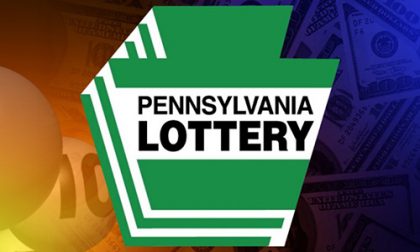Pennsylvania Casinos Sue State Lottery
Seven Pennsylvania casinos filed a lawsuit in Commonwealth Court Wednesday against the Pennsylvania Lottery, specifically the Pennsylvania Department of Revenue and Secretary C. Daniel Hassell, for offering online casino-style games, games which the casinos say are illegal under state gaming law.
The lawsuit comes as no real surprise. In May, the casinos protested the iLottery games, writing a letter to Pennsylvania Governor Tom Wolf, asking him to put a stop to them. He didn’t, so they sued.

Looks a lot like video slots, doesn’t it?
The casino plaintiffs in the lawsuit are:
• Harrah’s Philadelphia Casino & Racetrack
• Hollywood Casino at Penn National Race Course
• The Meadows Casino Racetrack Hotel
• Mohegan Sun Pocono
• Parx Casino
• Stadium Casino
• Valley Forge Casino Resort
The lottery is naturally a competitor to the casinos, as both are trying to attract people’s gambling dollars. The introduction of internet-based lottery games certainly didn’t make the casinos happy. The primary complaint the casinos have with the iLottery, though, is not so much that it exists, but that the games offered too closely resemble slot machines.
The suit points to Act 42, which was the gambling expansion bill that passed last year. In addition to authorizing internet poker, slots, and table games, Act 42 also permitted the state lottery to launch iLottery games. Part of the definition of an iLottery game is an “internet instant game,” which is defined as “a lottery game of chance in which, by the use of a computer, tablet computer or other mobile device, a player purchases a lottery play, with the result of play being a reveal on the device of numbers, letters, or symbols indicating whether a lottery prize has been won according to an established methodology as provided by the lottery.”
And key to the casinos’ argument is the next part, where the law excludes “games that represent physical, Internet-based or monitor-based interactive lottery games which simulate casino-style lottery games, specifically including poker, roulette, slot machines or blackjack.”
The casinos use that definition to accuse the iLottery’s games of being illegal, as they seem to “imitate the look, sound, and feel of slot machines.”
The casinos even point out that a number of the iLottery’s games, including Volcano Eruption Reveal, Robin Hood, Super Gems, Big Foot, and Monster Wins even have the same names or themes as slots machines that are currently on the gaming floors of Pennsylvania casinos.
The lawsuit goes into great detail as to how the iLottery games mimic slot machines, all while the law says that they are not permitted to do so:
44. True to its advertising, iLottery offerings are casino-style games that mimic the look, sounds, and feel of slot machines. The games also meet the Gaming Act’s defnition of a “slot machine.”
45. Several games offered by iLottery including Volcano Eruption, Reveal, Robin Hood, Super Gems, Slingo, Big Foot and Monster Wins are the same titles and/or themes as games offered on Petitioners’ gaming floors, the gaming floors of other casinos and/or by online gaming operators (not state lotteries) in jurisdictions outside of Pennsylvania.
46. All of the iLottery games feature the same user interface as a slot machine, and have the same interactive appearance, feel, and play experience that a player would expect from land-based and online slot machines. These features include graphics, animation, suspenseful music, flashing lights, bells or sounds played when combinations are hit, and similar visual and auditory features.
47. Several of the iLottery games require the player to “Bet,” “Set Bet,” “Choose Bet,” “Select Bet,” “Select Bet Amount,” or press a “Bet” button, as is typically seen in casino-style games and slot machines, whereas traditional Lottery products do not use the term “bet” or other betting terminology.
48. Several of the iLottery games feature symbols, such as dice, cherries, and the like, or use terms like, “pick a card,” that are commonly used in and associated with casino-style games.
49. Multiple iLottery games feature a spin function, wheels or cascading tiles and symbols as found in casino-style games.
50. Numerous iLottery games have an instant reveal function, associated with slot machines, and allow the player to immediately proceed to the next game with the press of a button.
There are even more similarities listed, like low price points that are found in casinos but not normal lottery games, bet multipliers, bonus plays, and even traditional three-reel displays. The results of lottery games, though, are pre-determined; the reels, symbols, and interactive appearance are all for show.
The coalition of casinos believes that the internet lottery “is a direct incursion by the state into the exclusive market of the licensed gaming operators,” particularly considering the licensing process, steep application fees, and taxes the casinos are subjected to in order to offer their games. In offering iLottery games that mimic slots, the casinos argue that the lottery has been able to circumvent all of that, putting it at a significant competitive advantage.
The casinos also take issue with the fact that people as young as 18-years old are permitted to play iLottery games, whereas the minimum age for internet casino games is 21, another advantage for the lottery.
“The actions of the Pennsylvania Lottery are illegal,” said coalition spokesperson David La Torre in a press release.
“To make matters even worse,” he added, “the agency is promoting casino-style gambling to teenagers. Pennsylvania casinos must follow very stringent regulations on underage gaming or face millions of dollars in fines. Meanwhile, the Lottery is openly violating the law and marketing these games to anyone as young as 18. Not to mention, any loss in casino revenue will hurt Pennsylvania’s tax collection for property tax relief and local improvement projects funded by gaming tax dollars.”



















COMMENTS